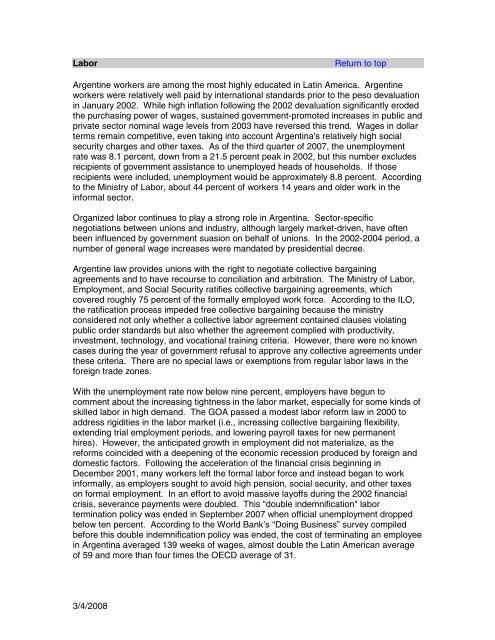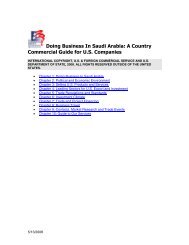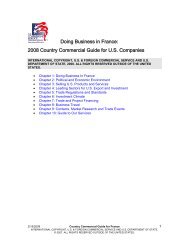You also want an ePaper? Increase the reach of your titles
YUMPU automatically turns print PDFs into web optimized ePapers that Google loves.
Labor Return to top<br />
Argentine workers are among the most highly educated in Latin America. Argentine<br />
workers were relatively well paid by international standards prior to the peso devaluation<br />
in January 2002. While high inflation following the 2002 devaluation significantly eroded<br />
the purchasing power of wages, sustained government-promoted increases in public and<br />
private sector nominal wage levels from 2003 have reversed this trend. Wages in dollar<br />
terms remain competitive, even taking into account <strong>Argentina</strong>'s relatively high social<br />
security charges and other taxes. As of the third quarter of 2007, the unemployment<br />
rate was 8.1 percent, down from a 21.5 percent peak in 2002, but this number excludes<br />
recipients of government assistance to unemployed heads of households. If those<br />
recipients were included, unemployment would be approximately 8.8 percent. According<br />
to the Ministry of Labor, about 44 percent of workers 14 years and older work in the<br />
informal sector.<br />
Organized labor continues to play a strong role in <strong>Argentina</strong>. Sector-specific<br />
negotiations between unions and industry, although largely market-driven, have often<br />
been influenced by government suasion on behalf of unions. <strong>In</strong> the 2002-2004 period, a<br />
number of general wage increases were mandated by presidential decree.<br />
Argentine law provides unions with the right to negotiate collective bargaining<br />
agreements and to have recourse to conciliation and arbitration. The Ministry of Labor,<br />
Employment, and Social Security ratifies collective bargaining agreements, which<br />
covered roughly 75 percent of the formally employed work force. According to the ILO,<br />
the ratification process impeded free collective bargaining because the ministry<br />
considered not only whether a collective labor agreement contained clauses violating<br />
public order standards but also whether the agreement complied with productivity,<br />
investment, technology, and vocational training criteria. However, there were no known<br />
cases during the year of government refusal to approve any collective agreements under<br />
these criteria. There are no special laws or exemptions from regular labor laws in the<br />
foreign trade zones.<br />
With the unemployment rate now below nine percent, employers have begun to<br />
comment about the increasing tightness in the labor market, especially for some kinds of<br />
skilled labor in high demand. The GOA passed a modest labor reform law in 2000 to<br />
address rigidities in the labor market (i.e., increasing collective bargaining flexibility,<br />
extending trial employment periods, and lowering payroll taxes for new permanent<br />
hires). However, the anticipated growth in employment did not materialize, as the<br />
reforms coincided with a deepening of the economic recession produced by foreign and<br />
domestic factors. Following the acceleration of the financial crisis beginning in<br />
December 2001, many workers left the formal labor force and instead began to work<br />
informally, as employers sought to avoid high pension, social security, and other taxes<br />
on formal employment. <strong>In</strong> an effort to avoid massive layoffs during the 2002 financial<br />
crisis, severance payments were doubled. This "double indemnification" labor<br />
termination policy was ended in September 2007 when official unemployment dropped<br />
below ten percent. According to the World Bank’s “<strong>Doing</strong> <strong>Business</strong>” survey compiled<br />
before this double indemnification policy was ended, the cost of terminating an employee<br />
in <strong>Argentina</strong> averaged 139 weeks of wages, almost double the Latin American average<br />
of 59 and more than four times the OECD average of 31.<br />
3/4/2008












